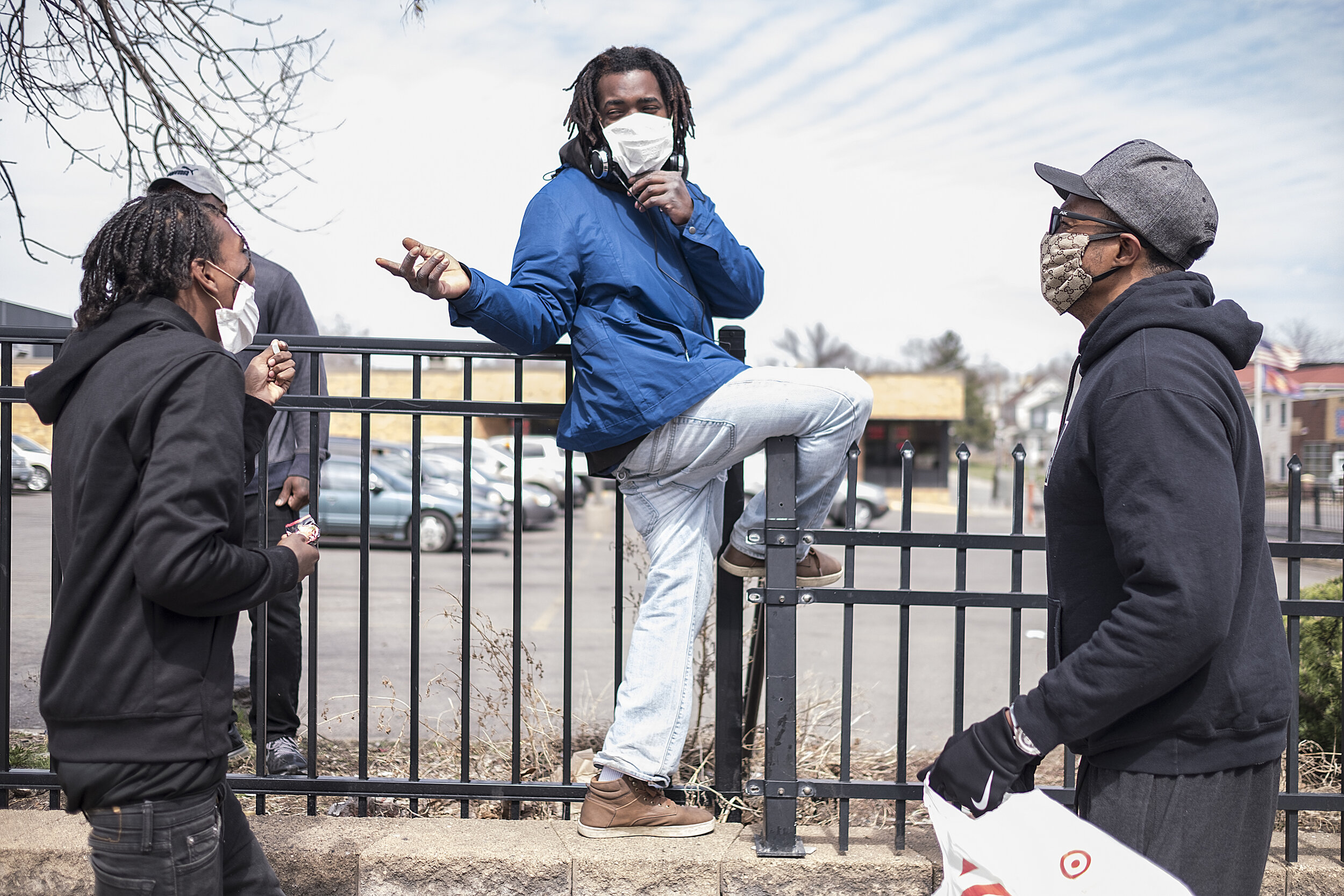Northsiders make masks to protect their community from COVID-19
Marques Armstrong gives out masks near the intersection of West Broadway and Lyndale Ave. N. Photo by David Pierini
By David Pierini Staff Reporter
A slew of sewers in North Minneapolis are making medical masks to protect the elderly, health care workers, and African Americans who, in other US cities, have been infected by COVID-19 at alarmingly disproportionate rates.
From fashion designers to retirees with sewing rooms in their homes, Northsiders are answering the call by state officials to flatten the curve and slow the spread of the deadly virus.
On a bustling stretch of West Broadway, members of the Racial Justice Network on Wednesday passed out dozens of donated and homemade masks, gloves, and hand sanitizer to people milling around bus stops and street corners.
Lifelong Northside resident Becky McConico has been sewing masks in her basement. Photo by David Pierini
With a shortage of masks available for purchase, the organization put out a call on social media asking for sewers to make them. Several people, having seen a Facebook post that day about the mask drive, showed up to the Cub Foods parking lot in search of a mask.
Many taking masks said, “thank you” and “god bless you.”
COVID-19 has already struck low-income, especially African American communities, in major cities like New York, Chicago, Milwaukee and Philadelphia, hard. In Chicago, one report suggested 70 percent of the dead are black. The city’s population is just 30 percent black. In Milwaukee, where the population is 27 percent black, 81 percent of the dead are black.
“We know North Minneapolis is susceptible to this health crisis,” said Nekima Levy Armstrong, who organized Wednesday’s mask drive. “We need to protect our community.”
Levy Armstrong said Racial Justice Network will pass out masks again once its supply is replenished. She said the organization can help interested sewers with fabric, elastic, and even sewing machines. Contact them here.
While the network has mobilized a roster of mask makers, there are others quietly making and distributing their own masks.
Becky McConico has been running her machine every day for two weeks, making masks out of fabric printed with “Christ” in different languages.
McConico, 67 and a lifelong Northsider, said she started making the masks for her sister in healthcare, who works at Hennepin County Medical Center. With masks in short supply at the hospital, her sister gladly accepted them and passed them out to grateful coworkers.
She has made more than 50 and gave some to MAD DADS for their peace activists to wear on the streets.
“My great grandmother was a Blue Star mom during World War II, and she used to tell us stories about tearing up rags to make bandages to go overseas,” McConico said. “I’m a Blue Star mom, and it’s kind of what I’m doing now. It’s not for the military, but I am trying to help in whatever way I can.”
Keiona Cook making masks at her fashion studio. Photo courtesy of Keiona Cook
Her friend, Linda Higgins, also wanted to help friends with jobs in hospitals. She made a first batch for healthcare workers, then continued to make masks for friends and neighbors.
Higgins said she went to a store to buy more fabric, and everyone she encountered was buying materials to make masks.
“Everybody is making masks,” she said. “I’m retired, and I have the time and the sewing machine. It’s something I could do to help people.”
Keiona Cook, a fashion designer who works out of Homewood Studios on Plymouth Avenue, said she has made close to 400 masks, most of them with a high-quality African wax-print fabric.
She gave away more than 30 masks, but now sells them at low cost as a way to recoup some of the business she lost when shutdown orders for non-essential business went in place. She lost more than $4,000 on prom dresses she was making. With schools closed, proms are likely to be cancelled.
Cook said she gets between 50 to 70 mask orders each day.
The prints she has chosen make her think of Wakanda, a fictional Sub-Saharan country in Africa that is the home of the superhero Black Panther.
“I was thinking Wakanda because I wanted to find a way for all of us to stay connected, even if we can’t be together right now.”



